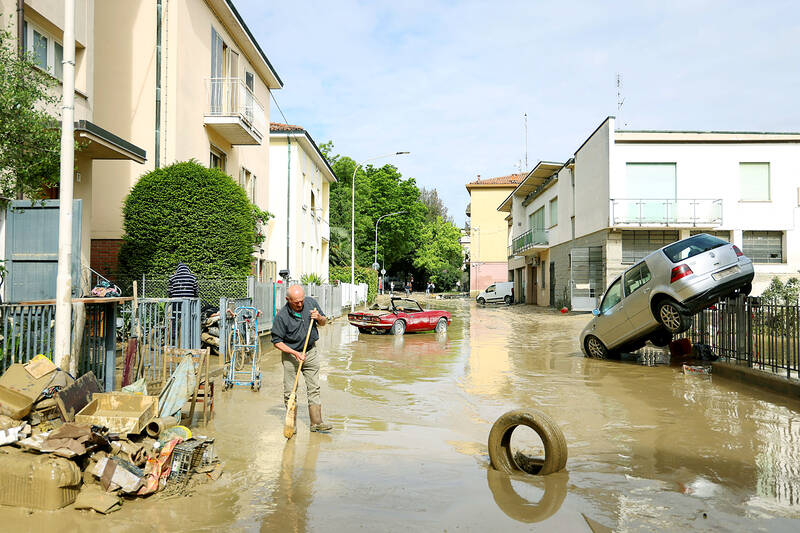At least eight people died in Italy’s northern Emilia Romagna region as heavy rains flooded rivers and submerged entire neighborhoods and farmland on Wednesday, prompting the cancelation of this weekend’s Imola Grand Prix.
Downpours that pounded the region’s flatlands over two days caused nearly two dozen rivers to burst their banks, putting vast stretches of territory under water and causing thousands of residents to be evacuated.
“The city is on its knees, devastated and in pain,” said Gian Luca Zattini, the mayor of Forli, a city south of regional capital Bologna. “It’s the end of the world.”

Photo: Reuters
Regional authorities confirmed eight dead, seven of them in the area around Forli and the city of Cesena.
About 37 municipalities experienced flooding, while many also reported landslides.
Two of the bodies in Forli were recovered by divers on Wednesday morning, as part of a huge rescue effort involving emergency services, armed forces and more than 1,000 volunteers.
Television images showed emergency workers carrying residents across flooded streets or transported in inflatable boats, vast parking lots completely submerged in water, while torrents of water rushed through the UNESCO-recognized porticoes of Bologna.
A video taken by Italy’s coast guard showed rescuers in a helicopter pulling up two elderly people from the roof of a home where the water level had nearly covered the first-floor windows.
One of Italy’s richest regions, Emilia Romagna had already been hit by heavy rain two weeks ago, causing floods that left two dead.
This time, about 50cm of rain fell within 36 hours in Forli, Cesena and Ravenna — about half the normal annual rainfall, a situation “with few precedents,” Italian Minister of Civil Protection Nello Musumeci said.
“It is still a very critical situation,” Musumeci told reporters.
The flooding caused the cancelation of Sunday’s Formula One Emilia Romagna Grand Prix scheduled in Imola, with organizsers saying they could not guarantee the safety of fans, teams and staff.
Emilia Romagna President Stefano Bonaccini said the region had been hit “like an earthquake.”
Rescue workers had scrambled through the night to save children, and elderly and disabled people from the rising waters.
“We’re scared, this time we’re scared,” said Simona Matassoni, the owner of Cesena’s Hotel Savio, which had so far escaped flooding.
“I was born here, I’ve seen lots of full rivers, but never anything like this,” she told reporters by telephone.
More than 10,000 people have been evacuated, authorities said, including about 3,000 in Bologna and 5,000 in Ravenna.
About 50,000 people were without electricity.
The civil protection agency urged “maximum caution” as mayors warned people to stay on high ground.
In Forli, an Agence France-Presse photographer saw people in a state of shock as they fled on Tuesday night through floodwaters in the dark in their bare feet.
Elsewhere, locals in Cesena swam down a road to rescue a three-year-old child and a man was seen wading through high water with his cat.
“We absolutely must not lower our guard,” Cesena Mayor Enzo Lattuca said on Facebook.
Residents “must not under any account go into basements or cellars” and should “stay out of ground floors if possible,” he said.
The heavy rains follow a drought that affected much of northern Italy last winter, and a record lack of rain last summer.
“We have to get used to it for the future, because unfortunately in recent years it often happens that these extreme rainfalls arrive,” Italian Air Force meteorologist Paolo Capizzi told reporters. “We have to get used to this type of climate.”
He said it could not directly be blamed on global warming, but the “ever-increasing frequency of these phenomenon can obviously be the consequence of ongoing climate change.”
Italian Prime Minister Giorgia Meloni, on her way to the G7 summit in Japan, tweeted her support for those affected and said the government was “ready to intervene with the necessary aid.”
Rain over the flooded area was expected to subside yesterday.

ANGER: A video shared online showed residents in a neighborhood confronting the national security minister, attempting to drag her toward floodwaters Argentina’s port city of Bahia Blanca has been “destroyed” after being pummeled by a year’s worth of rain in a matter of hours, killing 13 and driving hundreds from their homes, authorities said on Saturday. Two young girls — reportedly aged four and one — were missing after possibly being swept away by floodwaters in the wake of Friday’s storm. The deluge left hospital rooms underwater, turned neighborhoods into islands and cut electricity to swaths of the city. Argentine Minister of National Security Patricia Bullrich said Bahia Blanca was “destroyed.” The death toll rose to 13 on Saturday, up from 10 on Friday, authorities

DEBT BREAK: Friedrich Merz has vowed to do ‘whatever it takes’ to free up more money for defense and infrastructure at a time of growing geopolitical uncertainty Germany’s likely next leader Friedrich Merz was set yesterday to defend his unprecedented plans to massively ramp up defense and infrastructure spending in the Bundestag as lawmakers begin debating the proposals. Merz unveiled the plans last week, vowing his center-right Christian Democratic Union (CDU)/Christian Social Union (CSU) bloc and the center-left Social Democratic Party (SPD) — in talks to form a coalition after last month’s elections — would quickly push them through before the end of the current legislature. Fraying Europe-US ties under US President Donald Trump have fueled calls for Germany, long dependent on the US security umbrella, to quickly

Local officials from Russia’s ruling party have caused controversy by presenting mothers of soldiers killed in Ukraine with gifts of meat grinders, an appliance widely used to describe Russia’s brutal tactics on the front line. The United Russia party in the northern Murmansk region posted photographs on social media showing officials smiling as they visited bereaved mothers with gifts of flowers and boxed meat grinders for International Women’s Day on Saturday, which is widely celebrated in Russia. The post included a message thanking the “dear moms” for their “strength of spirit and the love you put into bringing up your sons.” It

In front of a secluded temple in southwestern China, Duan Ruru skillfully executes a series of chops and strikes, practicing kung fu techniques she has spent a decade mastering. Chinese martial arts have long been considered a male-dominated sphere, but a cohort of Generation Z women like Duan is challenging that assumption and generating publicity for their particular school of kung fu. “Since I was little, I’ve had a love for martial arts... I thought that girls learning martial arts was super swaggy,” Duan, 23, said. The ancient Emei school where she trains in the mountains of China’s Sichuan Province